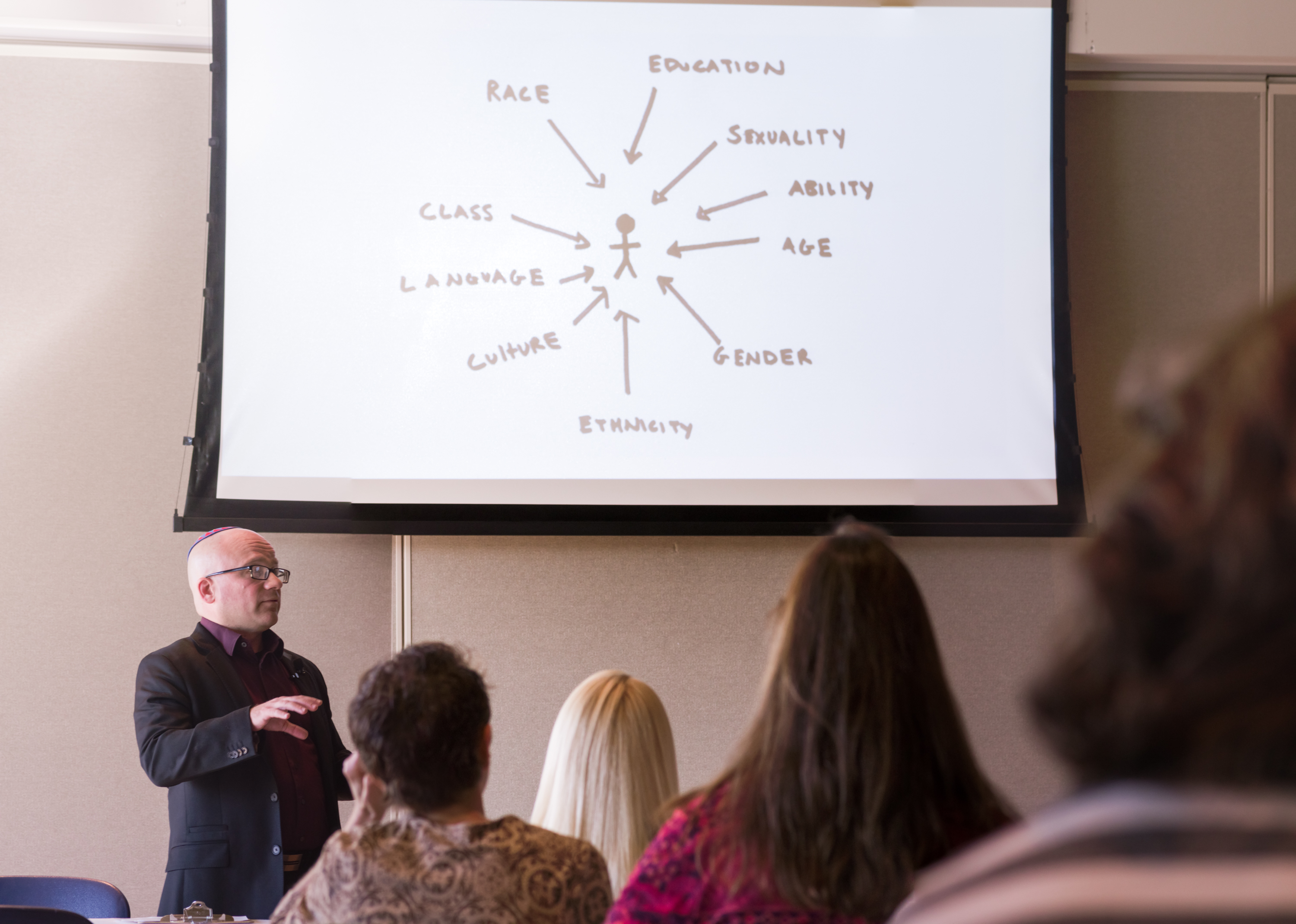Post-Doctoral Fellow of Jewish Studies Elliot Ratzman presents in the Esch Hurvis Room in the Warch Campus Center.
Photo by Billy Liu
To teach about anti-Semitism and how it exists in progressive movements, Post-Doctoral Fellow of Jewish Studies Elliot Ratzman presented the second lecture in the Cultural Competency Lecture Series. He presented his lecture, “Understanding the Subtleties of Anti-Jewish Oppression and Jewish Privilege,” on Wednesday, Oct. 18 at 11:30 a.m. in the Esch Hurvis Room.
Ratzman began his lecture by talking about Jewish people of color. While Jewish people are separate from white people, this does not mean that they are people of color. Ratzman stated that Jewish people of color are often underrepresented and not always immediately accepted into Jewish communities. Due to this, Ratzman stated that Jewish people, specifically Ashkenazim who mostly come from Europe, should not be considered people of color because it takes away from the representation that Jewish people of color need.
“The racial-political status of Jews is ambivalent. Ashkenazi Jews enjoy the privileges of whiteness, but have been, and are, threatened with forms of anti-Jewish oppression—antisemitism—that persist,” said Ratzman.
In the past few months with the events in Charlottesville, Va. where Jewish people have been explicitly targeted, questions about what privileges Jewish people have been brought up. This issue is complicated by how there were right wing Jewish people who voted for Trump. At the same time, Jewish people have been turned away from liberal groups, accused of being Zionists, and there have been incidents of tension between Palestinian rights groups and Jewish people.
Ratzman also specified which problems Jewish people still have, and which they do not in most circumstances. He specified that they no longer have barriers to employment and education, no constraints on where they can live, and also do not have to worry about violence by law enforcement. This, according to Ratzman, is what gives Jewish people privileges that other minority groups in the United States do not have.
However, Ratzman stated that Jewish people still have to be wary of a threat of violence. Jewish people still have a sense of minority status, deal with interpersonal slights and anti-Semitic politics as well as group trauma and awareness of global hostility.
Addressing the subject of Palestinian rights, Ratzman said that “Pro-Palestinian protests are not anti-Semitic, mostly, though they can be uncomfortable [for Jewish people]”. Critique of Israel becomes anti-Semitic when these critiques are based on imagery or themes that are classically anti-Semitic. Also, when critiques are based in theological or essentialist claims about Jewish people or Judaism, and when Jewish people are targeted by Palestinian resistance groups just because they are Jewish.
With this in consideration, Ratzman explained some different ways of how to be an ally. A couple of ways are opposing vulgar anti-Semitic claims and understanding the complex history surrounding Jewish people. Also, to fight for justice for Palestinians, but understand that Jewish people may have conflicted feelings surrounding Palestine.
“There are ways to criticize the State of Israel and bring Jews—especially progressive Zionists—into coalitions for justice in Palestine without dismissing Jewish claims about anti-Semitism,” stated Ratzman.
The next lecture in the Cultural Competency Lecture Series will be held on Thursday, Nov. 16 at 11:30 a.m. in the Esch Hurvis Room. This next lecture, “Powerful Ways to Respond to Microaggressions, Stereotypes & Isms” will be given by Professor Elizabeth De Stasio and Vice President for Diversity and Inclusion and Associate Dean of Faculty Kimberly Barrett. The lecture will be an interactive session which will address strategies for how to deal with microaggressions and stereotypes in ways that are empowering and self-affirming.

